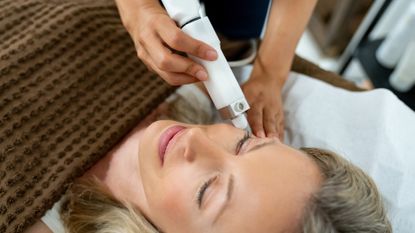
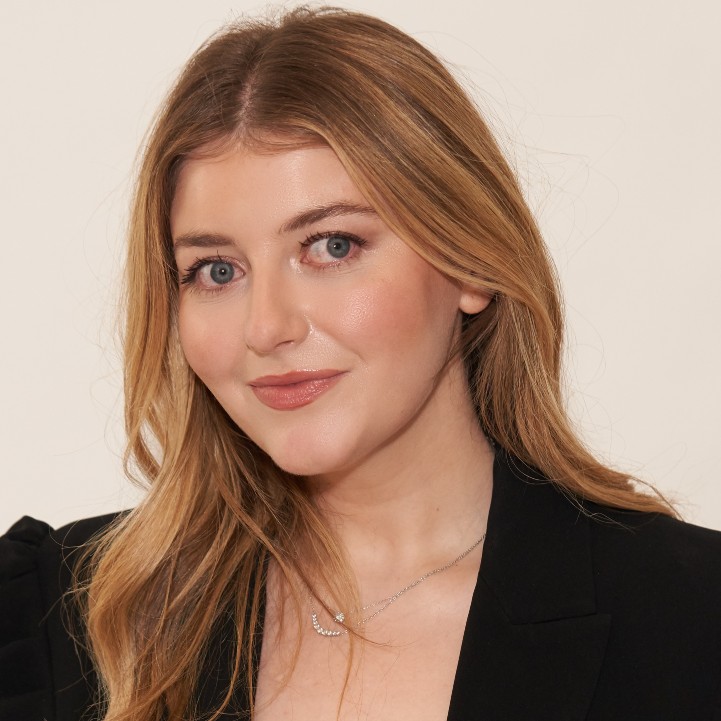
If you’ve dealt with acne, cystic pimples, or had a tendency to pick at your previous breakouts, it’s possible you were left with mild or severe acne scars. While the choice to treat those scars remains entirely your own, there are options if you’re looking to treat uneven texture or permanent color changes. Over-the-counter serums, spot treatments, and prescription topicals fall on one end of the spectrum. On the other end? Laser treatments for acne scars, a popular, effective, and well-vetted therapy. “They are effective at breaking up scar tissue and inducing the formation of new collagen, which will soften the appearance of scars over time,” explains board-certified dermatologist Dr. Dustin Portela.
That said, deciding to get a laser treatment for acne scars is a big decision. They’re an investment and can require downtime, so it’s best to have allllll the information. While you should pretty please consult with your board-certified dermatologist for personalized advice, we have talked to a handful of top practitioners to create a guide to laser treatments for acne scars. From the difference between laser therapies (there are two main categories) to the risks, cost, and realistic results, here’s everything you need to know.
Can a Laser Treatment Get Rid of My Acne Scars?
The short answer: Laser treatments can get rid of acne scars, to a certain degree. You will need a series of treatments (how many will be determined by your provider) and you should see major changes. “The goal is 50 to 75 percent improvement,” explains board-certified dermatologist and director of cosmetic dermatology at Schweiger Dermatology Dr. David J. Goldberg. “Scars will look much better to others and in pictures, but the patient may still see that something was there.”
The degree of healing in large part depends on how severe the scarring was to begin with. By and large, changes in color are going to be the easiest to get rid of, while texture is going to take longer. “In cases of mild scarring, and in some cases of moderate scarring, the evidence of scars may be completely removed. Severe acne scarring may not achieve 100 percent improvement, but great strides can often be made,” says Dr. Portela.
Types of Lasers
The specific type of laser used to treat your acne scar depends on the severity of your scars and the devices that your doctor has in-office. But, the majority of machines fall into two main categories: Ablative and non-ablative. “Ablative lasers are more aggressive, have greater downtime, and require fewer treatments,” says Dr. Goldberg. “Non-ablative lasers are less aggressive, have minimal to no downtime, and require more treatments.”
Ablative Lasers
If you’re dealing with severe acne scarring, you’ll likely respond best to ablative fractionated lasers, such as CO2 or Erbium. “These machines use a wavelength of laser that targets water in the skin and causes small holes to be burned into the skin in a grid-like pattern. These zones of injury are separated by areas of untreated skin so healing can occur quickly,” explains Dr. Portela. These micro-injuries will prompt the creation of new collagen, break down dense scar tissue, and over time, create a more even tone and texture.
A post shared by Julie Russak MD (@russakderm)
A photo posted by on
Non-Ablative Lasers
Non-ablative lasers are going to be preferred for teenagers, mild or moderate acne scarring, or anyone who doesn’t want to deal with downtime. While you can leave your treatment and go about your day immediately after treatment, you will need a greater number of sessions to yield similar results.
Stay In The Know
Marie Claire email subscribers get intel on fashion and beauty trends, hot-off-the-press celebrity news, and more. Sign up here.
One popular non-ablative laser is called the Lutronic Ultra, which is a thulium-based gas laser. “It is so effective on active acne, acne scarring, and the hyperpigmentation left over from it,” explains Nurse Tara Adashev APRN at Neinstein Plastic Surgery. “It has the capability to get deeper into the cellular level of the skin and break up the melanocytes, or the coloration, that’s creating the hyperpigmentation. This also helps create little micro-channels in the skin to break up active acne.”
A post shared by Nurse Tara (@nursetaranyc)
A photo posted by on
Microneedling
Okay, hear me out: Microneedling doesn’t ~technically~ fall into the laser category, but it’s still worth mentioning when talking about medical treatments for acne scars. “Although not a laser, it can also cause small injuries in the skin and lead to collagen production,” says Dr. Portela. A newer, more high-tech extension of microneedling is something called radiofrequency microneedling (RFMN). “This is a class of newer devices that are also highly effective at promoting collagen growth. RFMN uses a grid of small needles that are pressed into the skin, and while under that skin a current of radiofrequency is passed between the needles, heating the deeper layers of skin and stimulating collagen growth.”
A post shared by MDPen MicroNeedling & Skincare (@mdpenco)
A photo posted by on
Does a Laser Treatment Hurt?
On a scale of painless to unbearable, laser treatments are going to be classified as uncomfortable. They’re inducing heat in the skin, which isn’t necessarily a pleasant experience. Think: prickly, rubber band snapping mixed with a bad sunburn. “For many of these treatments, a topical numbing cream is sufficient to control the pain during the procedure,” says Dr. Portela. “For the more aggressive treatments, injections of numbing medication like lidocaine may be needed to adequately control pain.”
How Long Will it Take to Recover?
When it comes to the healing process, recovery time will vary. Skin will heal from an ablative laser in a few days to a week, whereas skin will be good to go just a few hours after a non-ablative laser. “You’ll be a little pink-ish for six-ish hours, but by the next morning you’ll just have dry skin,” says Adashev.
How Long Will it Take to See Results?
Laser treatments for acne scarring are a commitment. You’ll need a handful of treatments, typically spaced four to six weeks apart, in order to get the best benefits. “The final result can be seen in six months after the final treatment,” explains Dr. Goldberg.
Is There a Risk Associated With Laser Treatments for Acne?
While the results of a laser treatment can be life-changing, there are several risk factors to consider. First, you want to make sure that you’re going to a skilled provider. “If the wrong laser is used on someone, or the laser operator is inexperienced, lasers can inappropriately burn the skin or lead to worse scarring and pigmentation,” says Dr. Portela. This is especially relevant for people with more melanated skin. Adashev adds that when dealing with non-ablative lasers, it is possible for pigmented scars to turn darker temporarily before they turn lighter.
Infection is another factor to consider. “Any ablative laser treatment, or microneedling, is causing injury to the top layer of the skin, which means a risk of infection is present,” he adds. While this is rare so long as proper after care is followed, it is a possibility. Aftercare, while always important, is slightly more complex for anyone with a history of cold sores. “If you have a history of cold sores you should take an antiviral medicine after any laser treatment on the face as these devices can lead to cold sore development,” explains Dr. Portela. “Cold sores are caused by the herpes simplex virus and if you experience an outbreak following a laser treatment on the face they have the potential to spread anywhere on that treated skin, which can be catastrophic.”
As always, your doctor should run through all the risks associated with the treatment and be able to answer any personalized questions.
How Much Does a Laser Treatment Cost?
Unfortunately, laser treatments aren’t going to be covered by insurance, so you’ll have to pay out of pocket. Of course, prices are going to vary based on location, but you're likely looking at $1,000 or more when all is said and done. “The aggressive lasers are usually $2,500 per treatment and the less aggressive laser is usually $750 to $1,500 per treatment.”
Do I Qualify for a Laser Treatment?
While certain non-ablative lasers, such as the Lutronic Ultra, can help with acne active, it’s widely recommended that you get breakouts under control before shelling out the money for a resurfacing laser. “It does not make sense to treat acne scars with very active acne as that acne may create more scars,” explains Dr. Goldberg. Not only can this be futile, but it may make your scarring worse. “You risk spreading infection on the skin and you may end up chasing your tail if you are at risk of future scarring.”
While there’s no age cap on a laser treatment, both doctors recommend waiting until the later teen years.
How to Take Care of Skin After a Laser Treatment
“The aftercare will vary depending on the type of laser used,” says Dr. Portela. “Ultimately you should always follow the instructions given to you by the clinic following the treatment.” His advice? Stop using any active ingredients (think: retinoids, exfoliators, chemical peeling solutions, serums) and adopt a basic, hydrating routine complete with a gentle cleanser and hypoallergenic cream-based moisturizer. If you had an ablative treatment, you’ll likely also want to use Vaseline or Aquaphor on the skin for several days.
Regardless of the laser treatment you received, you’ll want to apply an SPF every morning. “Sun avoidance is mandatory for a couple of months too to lessen hyperpigmentation from the treatment,” adds Dr. Goldberg.
Meet the Experts
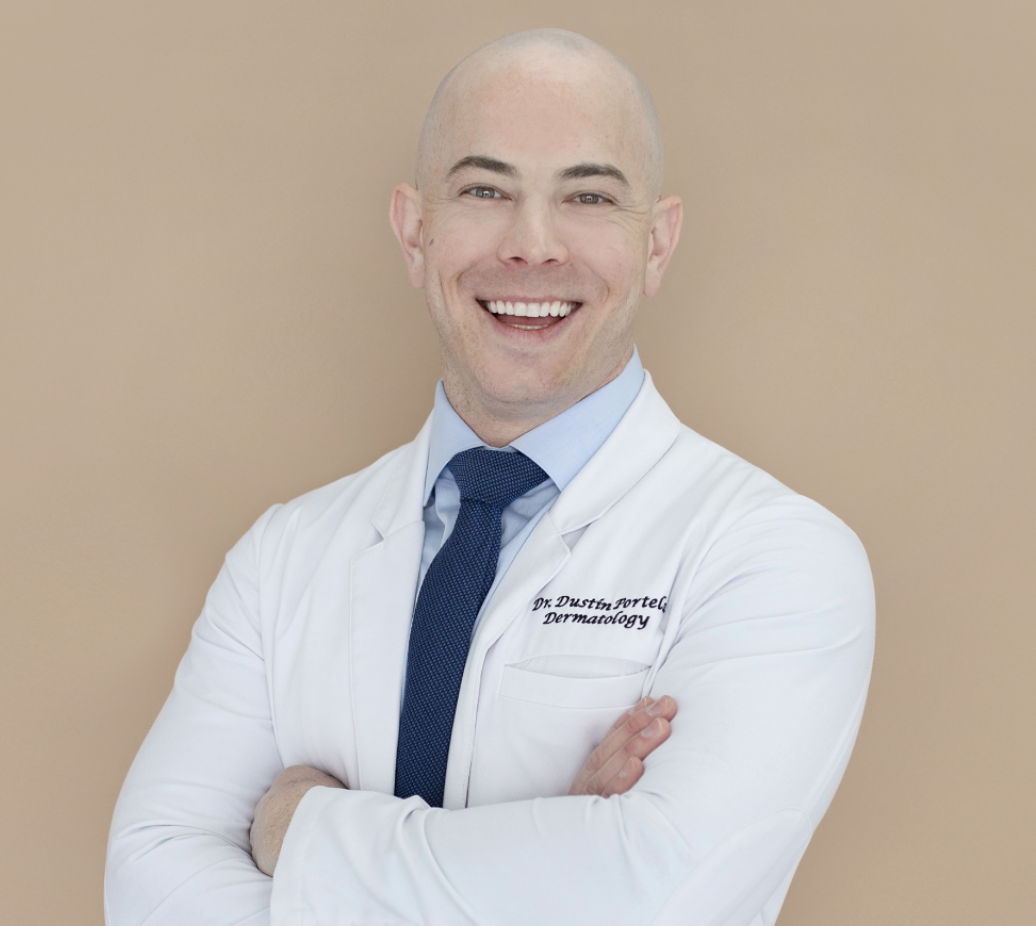
Dustin Portela, DO, is a Board Certified Dermatologist and Dermatologic Surgeon. He is certified through the American Board of Dermatology, the largest national group of board certified dermatologists. Dr. Portela is an Idaho native having grown up in Southeast Idaho. His professional interests include skin cancer surgery and facial reconstruction, skin cancer prevention, complex medical dermatology and wound healing. Dr. Portela has lectured at national dermatology meetings and has published articles in several medical journals. Dr. Portela graduated with an Honors-Bachelor of Science in Zoology from Idaho State University. He received his medical degree at Des Moines University in Des Moines, IA graduating among the top of his class and being recognized with the Award for Excellence in Physiology. Following medical school Dr. Portela completed his internship through Michigan State University at the Oakwood Southshore Hospital. His residency training in Dermatology and Cutaneous Surgery was completed at Michigan State University through the Beaumont Trenton Hospital in Trenton, Michigan, where he also received his training in Mohs micrographic surgery and was recognized with the Excellence in Dermatologic Surgery Award. Dr. Portela’s professional memberships include the American Academy of Dermatology, American Society for Dermatologic Surgery, American Society for Mohs Surgery, and the American Osteopathic College of Dermatology. Dr. Portela enjoys all aspects of dermatology, from skin cancer treatment and post-surgical reconstruction to cosmetic enhancement, as well as the care of both adult and pediatric patients.
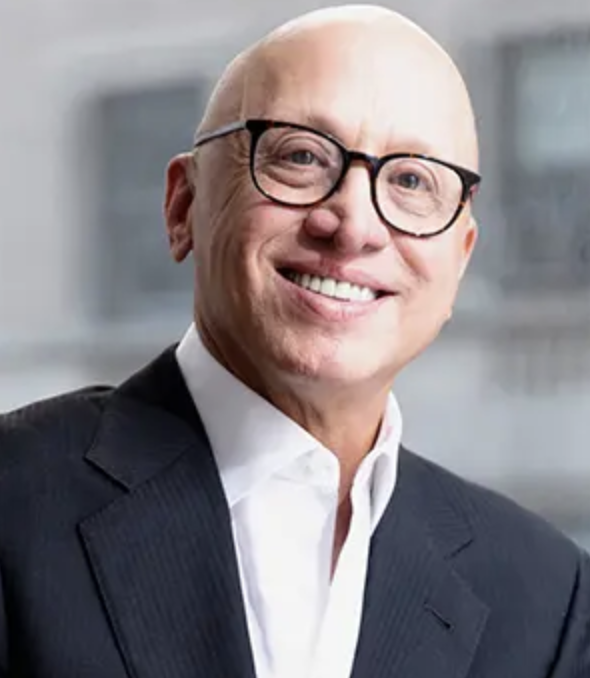
David J. Goldberg, MD, JD is recognized nationally and internationally for his innovative work with skin lasers, cosmetic dermatology and non-invasive facial and body rejuvenation techniques. A board-certified dermatologist who has been in practice since 1985, he has treated patients and taught doctors throughout the world in the use of these cutting-edge technologies. Under his direction, Skin Laser & Surgery Specialists of New York and New Jersey, a division of Schweiger Dermatology Group, has been a pioneer in making skin laser and cosmetic dermatology technologies available to the public.
Dr. Goldberg earned his medical degree from Yale University. He completed his dermatology residency and dermatologic surgical fellowship at New York University Medical Center. He is a clinical professor and former director of Mohs Surgery and Laser Research in the department of Dermatology at New York’s Icahn School of Medicine at Mount Sinai. Dr. Goldberg has published over 160 academic papers and has contributed to over 15 academic textbooks. He has authored textbooks on laser dermatology, laser hair removal, laser facial rejuvenation, photodamaged skin, skin wrinkle fillers, acne, rosacea, unwanted fat and cellulite. He has also co-authored two books for the general public: Light Years Younger and Secrets of Great Skin. Dr. Goldberg is active in professional societies and was elected president of the American Society for Lasers in Medicine & Surgery. He has also served as chairperson of the Ethics Committees of the American Academy of Dermatology, the American Society for Lasers in Medicine and Surgery, and the American Society for Dermatologic Surgery. He has sat on the board of directors of the American Academy of Dermatology, the American Society for Lasers in Medicine and Surgery, the American Society for Dermatologic Surgery and the International Society for Dermatologic Surgery. He has also served as a co-vice-president of the Skin Cancer Foundation.
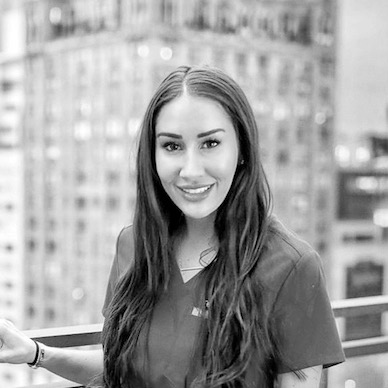
Nurse Tara brings her extensive training and advanced degree as a Nurse Practitioner to the Neinstein Plastic Surgery Team as lead nurse injector. To provide the exceptional results she is known for, Nurse Tara has a commitment to patient safety, pursuing higher levels of education through continuous training, an enthusiasm for advancing her practice and honing her skills whilst giving patients a personalized one-on-one experience. Nurse Tara believes in naturally enhanced beauty, and working with her patient’s to achieve their unique aesthetic goals. Nurse Tara’s ultimate goal is for her patients to look in the mirror and see the best version of themselves!

Samantha Holender is the Beauty Editor at Marie Claire, where she reports on the best new launches, dives into the science behind skincare, and keeps up with the latest trends in the beauty space. She has previously written for Us Weekly, Popsugar, Makeup.com, Skincare.com, and Philadelphia Wedding. Follow her on Instagram @samholender.
-
 Olivia Rodrigo Is Bringing Visible Bra Straps Back
Olivia Rodrigo Is Bringing Visible Bra Straps BackThe pop-punk princess wore custom Victoria's Secret at Coachella.
By Julia Gray Published
-
 Meghan Markle’s New Netflix Cookery Show Begins Filming Today—But Not Where You’d Expect It to Be Shot
Meghan Markle’s New Netflix Cookery Show Begins Filming Today—But Not Where You’d Expect It to Be ShotThe Sussexes are having a busy week this week, shooting both of their his-and-her Netflix shows and rolling out the first product offering for Meghan’s new lifestyle brand American Riviera Orchard.
By Rachel Burchfield Published
-
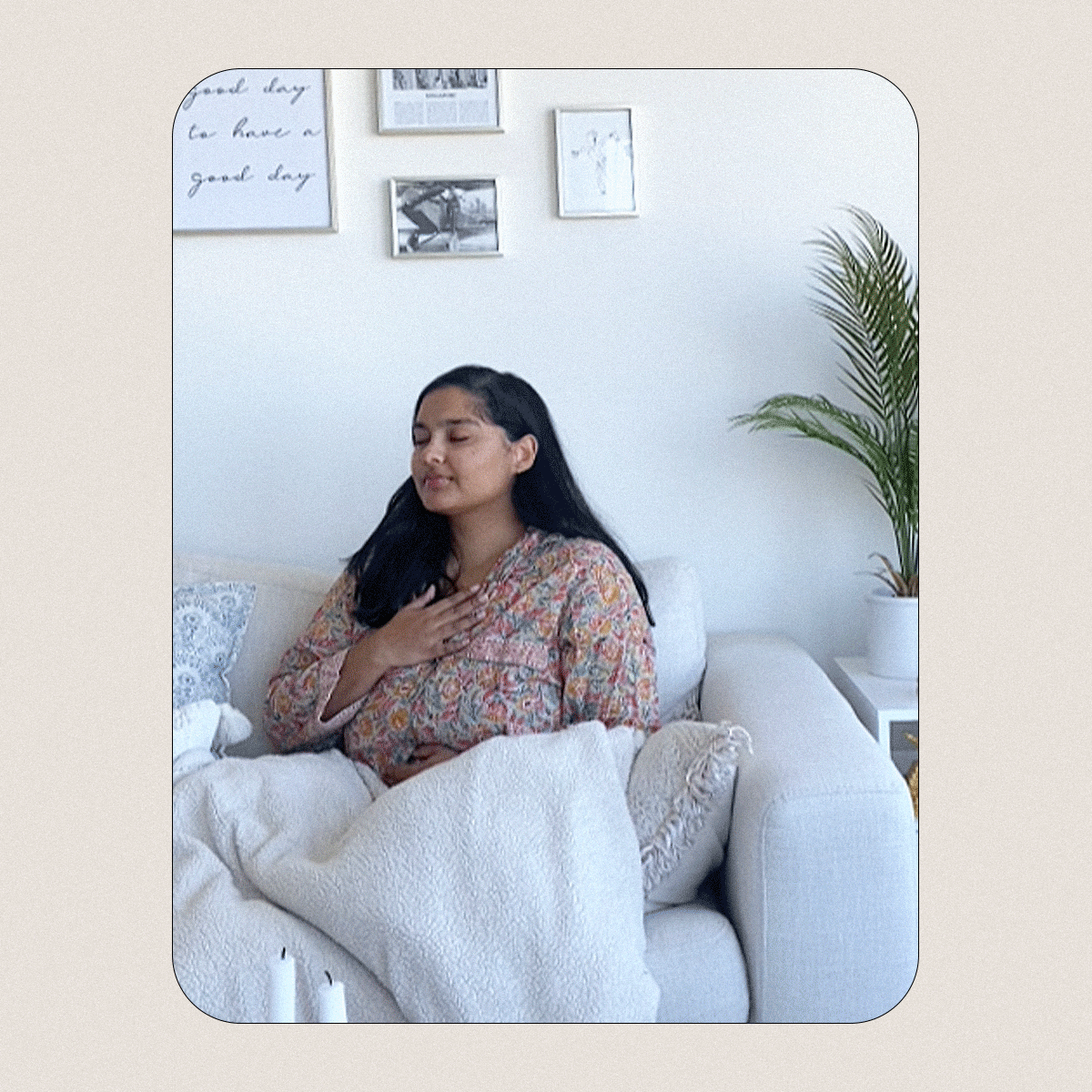 How I'm Redefining My Wellness Journey in 2024
How I'm Redefining My Wellness Journey in 2024Sponsor Content Created With The Honey Pot
By Aniyah Morinia Published